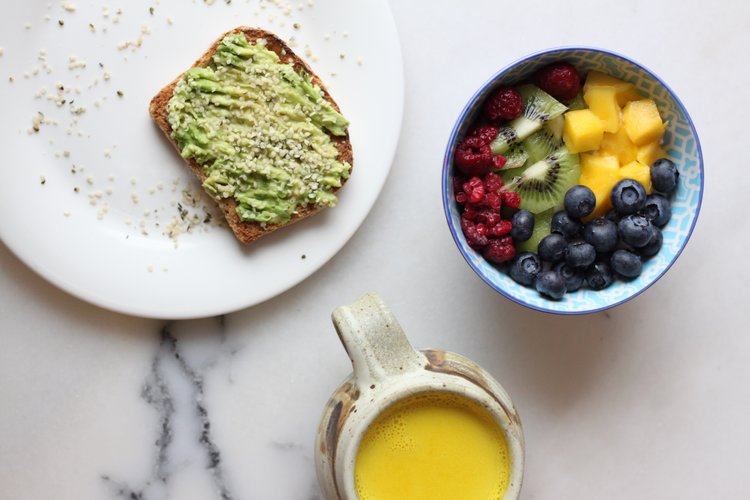
World Cancer Day is February 4th. Continuing with the Union for International Cancer Control’s three-year campaign slogan “We Can, I Can”, this day highlights how we, both as a society and as individuals, can reduce the burden of cancer. Cancer affects everyone, but we all have the ability to lessen the impact this disease has on individuals, families, and communities. There are a number of Key Messages that the UICC suggests we, both independently and together, should be focusing on pushing in order to help fight cancer. These messages (which you can find on their campaign website), range from promoting healthier cities and work environments to shaping policy changes. Two of UICC’s Key Messages stood out to us here at Living Kitchen: Make Healthy Lifestyle Choices, and Prevent Cancer.
We are what we eat, quite literally. The food that we put into our bodies has a tremendous impact on our health. Something as simple as changing what you eat could drastically lower your chance of developing cancer. For example, it has been established that a diet high in red meats, refined grains, and added sugars increases the risk of colorectal cancer; if you were to cut out those risk increasing factors and replace them with more plant based options, less added sugars, and whole grains, you would be lowering your chances of developing that type of cancer.
There is no doubt that there are certain foods that are renowned for their cancer fighting properties: Cruciferous vegetables, turmeric, and garlic are all disease fighting superfoods that come to mind. However, there are some lesser known foods that pack just as big of a punch when it comes to food for cancer prevention. This World Cancer Day, we can take a stand against this disease by making healthy lifestyle choices to prevent cancer.
Here’s our list of foods that are linked with cancer prevention, that you might not know about!
Probiotic/ Fermented Foods
Did you know that 80% of your immune system resides within your gut? This is thanks to the hundreds of billions of microflora that live in your digestive system. They enhance immune function, regulate bowel movements, and enhance nutrient absorption. The probiotics found in fermented foods provide the gut with good bacteria. This in turn regulates your bowels, and also prevents unwanted infections and pathogens as the good bacteria outnumber the bad. Probiotics have also been shown to possess anti-tumor properties, and support cells that are responsible for fighting infections and tumors. These powerful bacteria are found in fermented foods like yogurt, kefir, kombucha, kimchi, sauerkraut, and even in sourdough bread! They’re also available in supplement form for convenience.
Supergreens: Spirulina, Chlorella, Wheatgrass
If you’re looking to get a super concentrated amount of nutrients in the smallest amount of food, supergreens are your new best friend. Spirulina, a blue-green algae, contains all of the essential amino acids, several B vitamins (including folate!), and is high in iron, but its superfood properties don’t stop there. Studies have shown that spirulina helps to stop cancer cells from replicating; if cells can’t replicate, cancer can’t spread. It can be found in powder, tablet, or capsule form and makes a wonderful addition to smoothies, juices, and even soups. Chlorella is another supergreen that is a close cousin to spirulina. As well as being a great source of omega-3’s, it’s been shown to increase energy in breast cancer patients, prevent DNA damage, and even induce cancer cell death. Just like with spirulina, it can be found in powder, tablet and capsule form. Other super greens to look for and try out include wheatgrass and chlorophyll.
Mushrooms
Despite having been studied for their medicinal properties for ages, mushrooms are not always in the spotlight for their cancer-fighting properties as much as they should be. Known for having anti-cancer, antioxidant, antimicrobial and anti-inflammatory properties, mushrooms certainly are a powerful superfood. They also contain prebiotics, not to be confused with probiotics! Prebiotics are a specialized plant fibre which helps to feed the good bacteria in the gut. Think of it as a fertilizer for the good bacteria found in probiotic foods. Another awesome thing about mushrooms is their immunomodulating properties- they can help to regulate your immune system. A word of warning though: Not all mushrooms are created equally. The best mushrooms to eat that contain these wonderful benefits are shiitake, enoki, cremini, oyster, reishi, portobello, chaga, hen-of-the-woods, and turkey tail.
written by Rebecca Moutoussidis
References:
Jackson, F. M.D . (2016). Prebiotics vs. Probiotics. Retrieved from https://www.prebiotin.com/prebiotin-academy/what-are-prebiotics/prebiotics-vs-probiotics/
Fung, T.T. & Brown, L.S. Curr Nutr Rep (2013) 2: 48. doi:10.1007/s13668-012-0031-1
Gilhuly, K. (2015). Spirulina and Vitamin B Deficiencies. Retrieved from http://www.livestrong.com/article/492033-spirulina-b-vitamin-deficiencies/
World Cancer Day 2016-2018 (2017). Theme- We Can. I Can. Retrieved from http://www.worldcancerday.org/about/2016-2018-world-cancer-day-campaign
Yu, Ai-Qun, et al. “The potential role of probiotics in cancer prevention and treatment.” Nutrition and Cancer, vol. 68, no. 4: May-June 2016: pp. 535-544.
Maleki, Davood, et al, “Probiotics in Cancer Prevention, Updating Evidence,” Probiotics, Prebiotics and Synbiotics: Bioactive Foods in Health Promotion, 2016: pp. 781-791.
Zhujun, Wang, et. al. “Inhibitory effects of small molecular peptides from Spirulina (Arthrospira) platensis on cancer cell growth.” Food & Function, vol. 7, 2016: 781-788.
Gorjzdadeh, Homan, et. al. “Fatty acid composition of Spirulina sp., Chlorella sp. and Chaetoceros sp. microalgae and introduction as potential new sources to extinct omega 3 and omega 6.” Iranian South Medical Journal, vol. 19, no. 2: pp. 212-224.
Noguchi, Naoto, et. al. “The Influence of Chlorella and Its Hot Water Extract Supplementation on Quality of Life in Patients with Breast Cancer.” Evidence-based Complementary and Alternative Medicine, vol. 2014, 2014 March.
Yusof, Yasmin Anum Mohd, et al. “Hot Water Extract of Chlorella Vulgaris Induced DNA Damage and Apoptosis.” Clinics, vol. 65, no.12, 2010: pp. 1371–1377.
Patel Seema, et al. “Recent developments in mushrooms as anti-cancer therapeutics: a review.” 3 Biotech. vol. 2, no. 1, Mar 2012: pp. 1-15.



Sorry, the comment form is closed at this time.